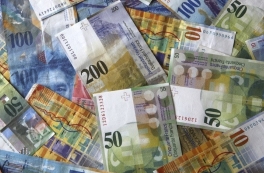Guidelines for Trading the Swiss Franc
Despite its diminutive size, Switzerland has always been very important within the international financial community and the Swiss Franc, its currency, also has key significance. It is the sixth most traded currency on the Forex market, despite the fact that the country’s economy in terms of nominal GDP is only 19th in the global ranking. The Swiss Franc is not commonly held as a reserve currency, even though the nation has a reputation for financial prudence and conservatism. The Swiss National Bank (SNB) is responsible for the management of the Swiss Franc, and it targets a consistent rate of inflation of about 2% while generally refraining from engaging in any stimulative monetary policies in response to any economic downturn.
The Swiss Economy and the Franc

Factors That Drive the Swiss Franc
There are numerous factors that drive the exchange rate of the Swiss Franc, including the following:
- Economic data releases – These include GDP data, information about industrial production and retail sales, trade balances and inflation rates. Other important information deserving of attention includes employment figures, scheduled SNB meetings, and any daily news pertaining to natural disasters, political climate, or any new government policy. All of these factors affect the exchange rate of the Swiss Franc.
- Swiss banking services – One major factor contributing to the value of the Swiss Franc is the worldwide demand for Switzerland’s banking services as a secure and confidential place to hold offshore funds. The Swiss Franc is also a stable alternative to the United States Dollar or the Pound Sterling in times of uncertainty and turbulence. Whenever other economies show signs of deterioration, the Swiss Franc increases in popularity with speculators and traders.
The Swiss Franc and Carry Trading
Carry trading is a trading strategy that is popular with many investors. Although one of the most common currencies for this style of trading is the Japanese Yen, the Swiss Franc is also popular with carry traders thanks to its low rates, liquidity and stability. Usually, carry trades that involve the Swiss Franc pair it with the Pound Sterling or the Euro, so investors wishing to participate in Forex trading with this currency must pay close attention to interest rates in the Eurozone and in the UK to determine the demand for the Swiss Franc.
Factors That are Unique to the Swiss Franc
Switzerland is famous for its neutrality as a nation, and this factor is exceptionally important in terms of the Swiss Franc currency and the country’s economy as a whole. Switzerland is independent from the Eurozone countries, although it does harmonise several of its policies with EU countries. Switzerland has less sensitivity to its neighbours’ economic performance due to its being a destination country of choice for the storage of offshore funds. Switzerland’s reliance on its financial sector does pose some risks, as some of the laws around the country’s banking secrecy have now been relaxed under pressure from other countries, including Germany and the USA. This may deter some people who would prefer to keep their money secret and safe from utilising these services, especially as some other nations such as Singapore have responded to this by tightening up their banking rules in order to promote themselves as a viable alternative for the holding of offshore accounts.
The Swiss Franc is also only controlled by decisions over interest rates made by the SNB rather than by economic conditions within the country. This is primarily because the Swiss Franc is more dependent on its utility as a stable, reliable and liquid alternative currency to other major currencies such as the US Dollar.







